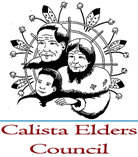|
 570 3rd Ave # 219 570 3rd Ave # 219
Bethel, AK 99559
(907) 543-1541
 625 C Street
Anchorage, AK 99501 625 C Street
Anchorage, AK 99501
(907)929-9200
anchoragemuseum.org
|
|
 
|
Photo: James H. Barker |
Andrew Foxie presents gifts to Angela Hunt on the second night of the Messenger Feast held in Kotlik, March 2003. An annual event in the past, this was the first Messenger Feast held in many years.
|
 |
Upluni kiagmek ayagluni, tamaa-i aruqutkaminek, yurautekaminek.
He begins getting ready starting in summer, gathering food and material to give away at the festival.
--Phillip Moses, Toksook Bay
|
 |
Maa-i man' kevgiryaraq upyutaqamegteggu calirpautekluku pilalliniat. Aptellriit tua piyugluteng piaqata tua-i uitayungermeng uitasciiganateng tauna tua-i piyukengaat unakengnaqluku tua piuratulliniameng.
When they got ready for the Messenger Feast they worked very hard. When someone asked for something, though they wanted to just lay back they couldn't sit still and would go out and work hard to acquire what that person wanted.
--Andy Paukan, St. Marys |
Kevgiq, the Messenger Feast, was a dance exchange during which pairs of villages took turns hosting each other. It was a rich display and distribution of the bounty of the harvest, providing a clear statement of respect to the animals who had given themselves to human hunters.
In the fall two messengers were sent to invite the guest village. Thus began much back and forth visiting during which the hosts communicated their desire for hard to obtain gifts from their guests, and vice versa. A three day festival in late February or March culminated these exchanges with dancing and an abundance of gifts. |
Enirarautet Dance Sticks
 |
.jpg) |
J. W. Johnson, 1886, Department of Anthropology, Smithsonian Institution 127672, 127673, 127674 |
| Enirarautet/Dance sticks used during the Messenger Feast. Frank Andrew explained: "The designs on dance sticks represented stories told by our ancestors. Some depicted stories about warfare, and some had carved pieces representing extraordinary experiences in hunting. Some stories were quite amazing, and they were explained to the audience during the festival." |
Next |
|

